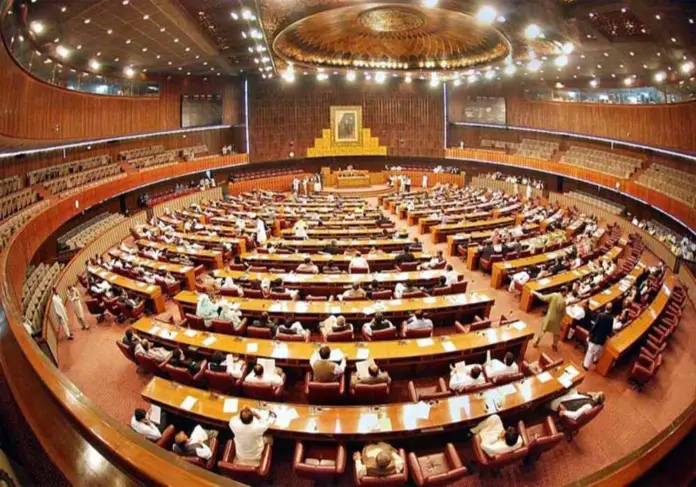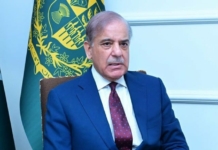The National Assembly on Thursday passed a resolution demanding the government rename Islamabad International Airport (IIAP) as Shaheed Benazir Bhutto International Airport (SBBIA).
The resolution, which was moved by Special Assistant on Kashmir Affairs and Gilgit Baltistan Nawabzada Iftikhar Ahmed Khan Babar, stated that the previous government had changed the name of Shaheed Benazir Bhutto International Airport to Islamabad International Airport. The resolution said the Pakistani nation can never forget the sacrifices of the Bhutto family and its role in the framing of the 1973 constitution.
Meanwhile, Minister for Aviation Khawaja Saad Rafique told the lower House of parliament that there is no proposal under consideration to dissolve CAA Employees Pension Fund Trust. Responding to a query of MNA Aliya Kamran during Question Hour, he said CAA Service Regulations-2014 is the guiding document to protect the financial rights of the pensioners of Authority. The authority has established ‘CAA Employees Pension Fund Trust’ with the participation of indigenous employees being trustees of fund.
To ensure sustainability and growth of pension fund, he said funds were being invested with the highest return-generating instruments, payment of pension retirement benefits is made in timely manner and there were appropriate controls in place to ensure accuracy, transparency and timely disbursal of payment to pensioners. Replying to another question, the Minister said there was no proposal under consideration to transfer the Employees Pension Fund of Civil Aviation Authority to the federal government.
100 smart classrooms
Parliamentary Secretary for Education Zeb Jaffar Thursday informed the National Assembly that the project for establishment of one hundred smart classrooms in universities has entered its final stage and is expected to be functional by the end of this year. Taking the floor, she informed the legislators that the government has taken several initiatives to ensure digital literacy across the country.
She said the Higher Education Commission (HEC) has launched Digital Learning and Skill Enrichment Initiative to provide an opportunity to the students and faculty members of all the private and public sector universities to apply online and get unlimited access to over 1,200 courses. While supporting the mandate to develop e-Academia, she said the HEC has established the national video conferencing network for higher education sector and provided world-class purpose-built video conferencing facility at all the universities.
The Commission has signed an education transformation agreement with Microsoft through which capacity building training and workshops are delivered on the products being offered to Higher Education Institutions (HEIs), she expressed. In terms of Microsoft Teams, she told the HEC made the platform available for 80,000 faculty and one million students across the country. During covid-19 peak time universities reported an estimated 500 thousand active usage on teams’ platform for digital classes across the country, she maintained.
To promote the development and dissemination of ICT technologies, she said cultivate ICT talent for society, and meet the long-term talent requirement so far ICT academies program (phase I) launched at 13 Pakistani Universities in collaboration with Huawei, where the selection was made on competitive proposals from the Universities from all over the country. Huawei ICT competition 2020-21 was the first online competition where over 11,000 students from 70 plus Pakistani HEIs participated and Pakistani student’s teams stood 1st and 2nd in the Middle East Regional Finals, she told.
The Parliamentary Secretary said so for far five projects under National Research Program for Universities was awarded to support research on competitive merit for conducting high-level and promising scientific research, demonstrating strategic relevance and impact to local industry and society. Zeb Jaffar said under National Digital Library Program, public and private sector universities and institutions have access to a wide range of digital resources (journals, research article, case studies thesis and databases).
To address the critical need for improving communication, she told that Higher Education TV channel was launched with the stakeholders and building awareness about the National Higher Education Standards, quality assurance policies, financial management governance and regulator management. Moreover, she said her ministry has launched a Radio School to cater the educational needs of students during second wave of Covid-19 which helped students carrying out their uninterrupted learning where there is lack of access to the internet or television. All the leading education and institutions working under the FDE started online classes to keep the students to engage and help them accelerate their learning at home successfully.
E-Taleem Portal is another project to facilitate online education of students with the collaboration of education technology partner. The portal provides access to lectures and learning material through internet. After a successful Pilot in the Federal Capital where schools were incorporated with Google Work-space for Education and provided training on how to use Google tools for distance learning and creating a digital infrastructure in school, the project was scaled up and a total of 424 schools have been added in the admin portal, she concluded.
261.36 million trees
The National Assembly was informed that a total of 261.36 million trees have been planted in the country by the provincial/territorial forest department from April 2022 to July 2022 to enhance forest cover. Minister for Climate Change Sherry Rehman during a Question Hour session told the Lower House of the Parliament that 71.69 million trees in Punjab, 93.377 million in Sindh, 87.414 million in Khyber Pakhtunkhwa, 3.17 million in Balochistan, 2.73 million in Azad Jammu and Kashmir and 2.98 million in Gilgit-Baltistan were planted during the period.







